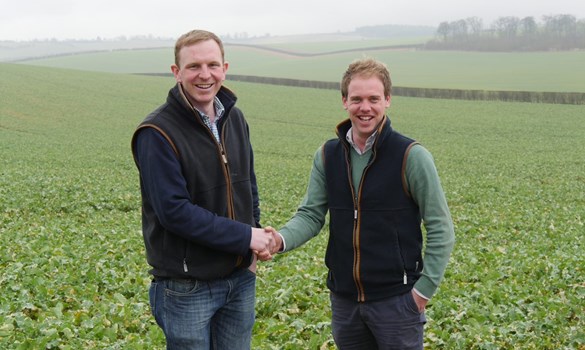Yield and breeding: Duxford
Yield and breeding
Duxford Monitor Farm meeting
Plant breeding and the introduction of new traits is going to be hugely important going forwards.
Hear about what the leading breeders are doing in this area through a panel discussion with KWS, RAGT and Saaten Union. Ask your questions and make your suggestions!
How will the AHDB Recommended List stay up-to-date and provide the information that you need? Sean Burns talks about the changes coming.
Is hybrid wheat the future? Tom Mead and David Hurst are trialling 1ha of this new variety – hear how establishment has gone for them.
Speakers and topics
- John Miles: KWS
- Cathy Hooper: RAGT
- Andrew Creasy: Saaten Union
- Sean Burns: AHDB
Programme
- Registration with coffee and a bacon roll
- Welcome and introduction: Teresa Meadows, AHDB
- Farm update: David Hurst and Tom Mead, Duxford Monitor Farmers
- What would you look for in a new variety? Group discussion
- Breeding – the future
- John Miles, KWS
- Cathy Hooper, RAGT + video
- Andrew Creasy, Saaten Union
- Sean Burns, AHDB
- Refreshment break
- Panel discussion with speakers
- Getting involved in the future Group discussion
- Meeting summary and close: Teresa Meadows, AHDB
- 12:15 depart
For more information:
Please contact Teresa Meadows by e-mail teresa.meadows@ahdb.org.uk or call 07387 015465.
About Duxford Monitor Farm
Tom Mead and David Hurst are hosting the Duxford Monitor Farm together. They farm within nine miles of each other at the Hertfordshire/ Cambridgeshire border and their land is joined by the old Icknield Way. With different businesses but common goals and problems, the jointly-hosted Monitor Farm will provide an opportunity to look at collaboration, farm management and business resilience from two different perspectives.
Tom Mead is a partner at Bleak House Farm in Cambridgeshire. The family farm has 377ha of arable cropping, growing wheat, barley, oats and oilseed rape, as well as sugar beet. They use a mixture of ploughing and minimal tillage cultivation, aiming to cultivate as shallow as possible when the conditions allow. The farm has storage capacity for around 2,000 tonnes. Winter barley and OSR are generally sold at harvest and wheat and oats are stored longer and marketed between harvest and the following spring. Tom is a graduate of the Tesco Future Farmers programme and is particularly interested in running an efficient farm business on a small scale. He also wants to find ways to push the business forward, looking in detail at soils, how to stay profitable, focus on the customer and maintain a good work-life balance.
David Hurst is the arable manager at Law Farming in Hertfordshire. He manages 1,355ha of arable cropping including rye, wheat, barley, oats, spring barley, forage rape, spring mustard and sugar beet. The farm also has a 1,750 head sheep flock, rents land out for pigs and there are plans to introduce cattle back on to the farm. There are three full-time staff and a harvest student. The farm is ploughed for grass leys and winter and spring barley, but a one pass operation is used elsewhere. David’s ambition for the business in the short term is to continue to reduce fixed and variable costs, without affecting productivity or the quality or value of output. During the Monitor Farm programme, David is looking forward to learning from other farmers and wider industries across the supply chain.
For more information please visit the Duxford Monitor Farm page


